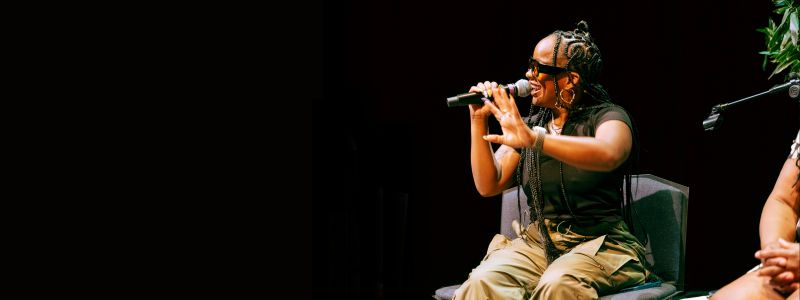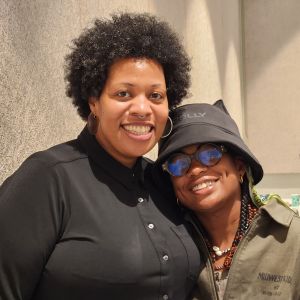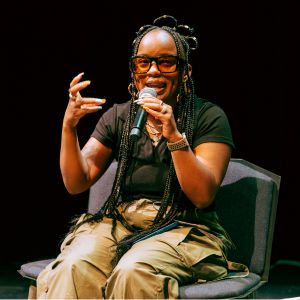On Resistance and Healing

Party Noire – a dance party and celebration of Black queer joy – arose as an act of worldbuilding. It was created to challenge oppressive systems and assert the power of love as a radical act. Antigone, as a text, often serves a similar purpose.
Director of Engagement Kamilah Rashied recently spoke with Party Noire co-founder and mental health practitioner, dr. nick alder, about the relationship between Party Noire and Antigone. Covering topics of civic action, mental health, healing, and change, their discussion is a preview of Court’s newest program: the Agora Conversations. This discussion series invites thinkers, creatives, and activists to share bold ideas about the lived experiences of Chicagoans today, connecting the art on Court’s stage with current events.
We invite you to join us for the inaugural Agora Conversation. Read on to learn more.
Kamilah: I wanted to start this series because I felt like we needed a dialogue with people outside of ourselves. The Agora Conversations stem from the idea that it’s really important to have animated dialogue with people who have strong opinions and really declarative thoughts on topics that matter. It’s a new program, and the first Agora Conversation is going to be centered around Court’s production of Antigone.

Why Antigone? Antigone had the least amount of power, she had endured a lot of loss, but that wasn’t a deterrent in pressing forward. She still took action. I think it’s interesting to think about what civic action looks like as a verb. What does wanting a more just world look like as a lifestyle? That’s why I wanted to speak with you, specifically, because so much of what you do is not just a job. It’s a lifestyle.
But I want to go back in time a little bit to how this happened. How did you realize that you were interested in getting a PhD? That you were interested in studying mental health. How did that come about?
dr. nick: When I was in school, I had a professor named Dr. Leo Wilton. He was a psychologist, and a queer man, and he was studying HIV and AIDS within the Black community. He had a fleet of classes that were about the psychology of racism, psychology of the Black family, and I was like, “ Oh, I’m taking all these classes.” I became a TA and immersed myself in a very Black understanding of mental health and psychology that I had no clue existed – I was reading Frantz Fanon for the first time and realized that there are people who think about the mental health of Black people from a revolutionary standpoint.
Dr. Leo Wilton’s expansiveness as a scholar, educator, and community care worker was eye-opening. I was deeply inspired by everything he did outside of the classroom, just as much as what he did inside, and he was one of my first possibility models of love as justice in public. It was that experience and that professor that inspired me to get a PhD.

I then started to think about what it looks like to be a mental health practitioner who’s really deeply embedded in a community and responsive to movements as they’re emerging. I was raised by West Indian women, so I don’t know any other way of being besides being a person who has my hands in so many things, doing work. I tend to see myself in the tradition of Black feminists, who are all PhD holders, who decided to educate in public, or decided to use church houses as a place of education, or decided to use barbershops as a place of education, or decided to use the library as a place of education and I think that speaks to the practice of Party Noire. Essentially, Party Noire feels like queer church. And that imagery of queer church conjures a space for release as we’re moving through a world of state violence and oppression. It’s a space where folks can get their spirits filled.
Founded in 2015, Party Noire is a dance party and a movement that celebrates Black femmes, Black womanhood, and Black queer creatives. It is a proverbial temple in which attendees move, sweat, and celebrate Black joy. The radical and affirming environment that makes Party Noire quite distinctive is also quite deliberate, having been curated with care by founders dr. nick alder and Rae Chardonnay.
Kamilah: It’s been important for me – as a Black person, as a queer person, as a womanist – to really understand the radical care involved in Party Noire and how you all have thought about building these spaces for Black women. Centering Black women and femmes is a big deal.
I think it’s worth mentioning that you never really saw it as just a social gathering – you took it in all these other directions, as well – and that makes me think of the roles that Black femme creatives can play. People are paying attention to the culture that Black women make, what we’re saying, and our aesthetics. People want to pay homage to that, whether it’s Angela Davis or Alice Walker…
dr. nick: Exactly. I was thinking about the way that the current Black Lives Matter movement is held up by the ideology, the writings, and the teachings of Black women – Black womanists – so, exactly to your point: Alice Walker, Angela Davis, Audre Lorde, Alexis Pauline Gumbs…Black womanists who are very foundational to my practice.

Kamilah: I absolutely see that thread of what you all are doing, and that continuity is really beautiful. These Black women gave us the blueprint, and being able to go back, and find them, and learn about them…. It’s so important.
dr. nick: It is! It’s a personal commitment to a Black feminist care ethic and a commitment to creating these incubators, these ecosystems of care, where community is invited. Mental health, to me, is connected to liberation. Let’s struggle together and learn how we want to be in relationship with each other. It was just a practice, a way of being, that my womanist upbringing brought to the forefront.
Party Noire was our way of creating worlds where femmes could be in a social public space and experience a sense of safety, because we heal in relationship. We heal in community. Activating our personal and collective healing is the core of realizing our capacity for change.
Learn more about the Agora Conversations here, and join us for the first discussion on Monday, February 12 at Experimental Station (6100 S Blackstone Ave).